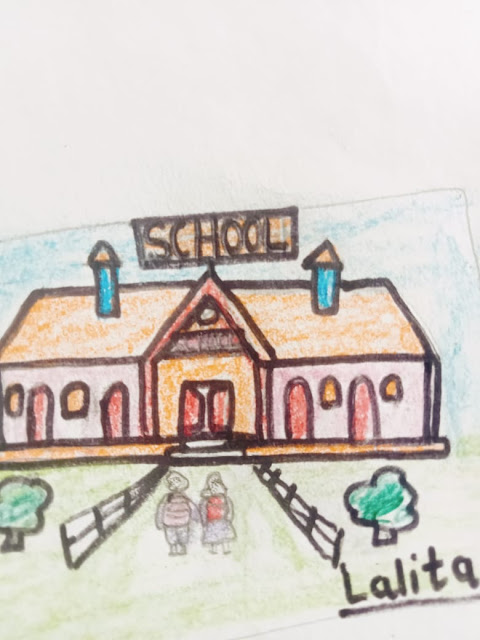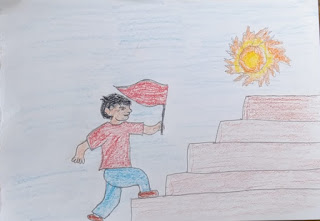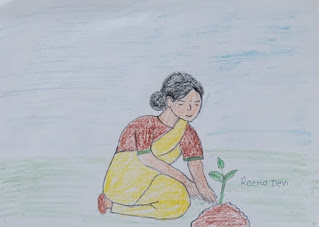
How will we move ahead and make our school from good to great
The staff team at AFA shows the way by stating a clear vision and mission for the school. We ensure that every stakeholder is involved in the process, and we grow together.
मेरी कल्पना की आर्थर फुट एकेडमी
जब मैं अपनी आँखें बंद करती हूँ और कल्पना करती हूँ, तो मुझे भविष्य की आर्थर फुट एकेडमी एक ऐसे स्थान के रूप में दिखती है जहाँ हर बच्चा मुस्कान के साथ सीखने आता है। स्कूल का वातावरण शांत, सुरक्षित और प्रेरणादायक है। बच्चे आत्मविश्वास के साथ खुलकर बोलते हैं, सहयोग करते हैं और अपनी जिम्मेदारी समझते हैं। यहाँ शिक्षा के साथ-साथ संस्कार, नैतिकता और व्यावहारिक ज्ञान भी दिया जाता है। स्कूल में तकनीक और परंपरा का सुंदर मेल है — बच्चे स्मार्ट क्लास से भी सीखते हैं और पेड़ के नीचे बैठकर प्रकृति से भी।
समाज में आर्थर फुट एकेडमी की पहचान एक ऐसे स्कूल के रूप में होती है जहाँ से शिक्षा प्राप्त कर बच्चा न सिर्फ पढ़ा-लिखा होता है, बल्कि एक अच्छा इंसान भी बनता है। लोग कहते हैं – इस स्कूल में न सिर्फ रटा-रटाया ज्ञान, बल्कि जीवन जीने की कला सिखाई जाती है।
Vision
प्रश्न: हम अपने स्कूल के बच्चों का भविष्य कैसा बनाना चाहते हैं?
उत्तर: हम चाहते हैं कि आर्थर फुट एकेडमी के बच्चे आत्मनिर्भर, संवेदनशील और समाज के लिए उपयोगी नागरिक बनें। वे न केवल पढ़ाई में अच्छे हों, बल्कि नैतिक मूल्यों को भी समझें और अपनाएं।
Mission
प्रश्न: हम बच्चों को एक बेहतर समाज के लिए कैसे तैयार कर रहे हैं?
उत्तर: हम बच्चों को समूह कार्य, सामाजिक सेवा, नैतिक शिक्षा और संवाद कौशल सिखाकर उन्हें एक जिम्मेदार नागरिक बनने की दिशा में ले जा रहे हैं।
- साक्षी पाल
हम अपने बच्चों के लिए कैसा भविष्य चाहते हैं?
हम अपने बच्चों के लिए एक सुरक्षित, सुखद और उज्ज्वल भविष्य चाहते हैं। हम चाहते हैं कि वे स्वतंत्र रूप से सोच सकें, अपने सपनों को पूरा कर सकें और अच्छे इंसान बनें।
हम चाहते हैं कि उन्हें अच्छी और नैतिक शिक्षा मिले जिससे उन्हें जीवन में सफलता मिले। न सिर्फ किताबी ज्ञान, बल्कि व्यावहारिक ज्ञान और जीवन मूल्यों की भी समझ हो।
स्वतंत्र सोच और आत्मनिर्भरता
हम चाहते हैं कि हमारे बच्चे आत्मनिर्भर बनें, जो अपने भविष्य के फैसले स्वयं ले सकें और जीवन की समस्याओं का सामना खुद करें। वे संवेदनशील, दयालु और मददगार हों। हम उन्हें सच्चाई और ईमानदारी से जीवन जीना सिखाते हैं।
वे सभी के साथ मिल-जुलकर प्रेम से रहें और सभी का आदर करें।
हम चाहते हैं कि हमारे स्कूल के बच्चे खुशहाल, आत्मनिर्भर और समाज के लिए उपयोगी बनें।वे कल के नेता, वैज्ञानिक, शिक्षक, कलाकार और अच्छे इंसान बनकर देश-दुनिया में नाम रोशन करें।
हम बच्चों को एक बेहतर समाज के लिए कैसे तैयार कर रहे हैं?
हम जानते हैं कि हमारे देश और समाज का भविष्य हमारे बच्चों पर निर्भर करता है। इसलिए हम उन्हें सोच-समझकर और पूरी मेहनत से तैयार कर रहे हैं। हम उन्हें सिखा रहे हैं:
हम सिर्फ किताबों की पढ़ाई ही नहीं कराते, बल्कि उन्हें नैतिक शिक्षा भी देते हैं ताकि वे सही और गलत में फर्क समझ सकें।
आज के डिजिटल युग में हम उन्हें सिखाते हैं कि वे मोबाइल, इंटरनेट और गैजेट्स का इस्तेमाल सिर्फ पढ़ाई और अच्छी चीजों के लिए करें, न कि गलत चीजों में उलझें।
Equality and Respect
हम उन्हें यह सिखाते हैं कि सभी इंसान बराबर हैं – चाहे वे किसी भी धर्म, जाति या आर्थिक स्थिति से हों। सभी का सम्मान करना चाहिए। उन्हें Unity in Diversity और Gender Equality की भी सीख दी जाती है।
Social Work and Community Service
हम बच्चों को दूसरों की मदद के लिए प्रोत्साहित करते हैं – जैसे बुजुर्गों की सहायता करना, गरीब बच्चों को पढ़ाना या समाज के लिए कुछ उपयोगी करना। इससे उनमें जिम्मेदारी की भावना आती है। हम बच्चों को केवल पढ़ा नहीं रहे, बल्कि उन्हें responsible citizen, good human being और socially aware व्यक्ति बना रहे हैं ताकि वे आने वाले समय में एक मजबूत, शांतिपूर्ण और बेहतर समाज बना सकें।
- स्वाति
मेरे सपनों का Arthur Foot Academy
हमारा Arthur Foot Academy ऐसा होना चाहिए जहाँ ईमानदारी और नैतिकता हर बच्चे में हो। स्कूल का माहौल ऐसा हो कि बच्चे दबाव में न होकर, उत्साह के साथ कहें – "कब सुबह हो और कब हम स्कूल जाएँ!"
पढ़ाई के साथ-साथ बच्चे खेल, गायन, नृत्य जैसे गतिविधियों में भी सबसे आगे हों। और जब वे स्कूल से बाहर निकलें तो लोग पूछें – "कहाँ से पढ़कर आए हो?"
हमारे बच्चे न केवल अपने स्कूल, बल्कि अपने गाँव और समाज का भी नाम रोशन करें।
Vision
प्रश्न: आपके सपनों का Arthur Foot Academy कैसा हो?
उत्तर: मैं चाहती हूँ कि Arthur Foot Academy ऐसा हो जहाँ बच्चे सिर्फ पढ़ाई ही नहीं, बल्कि अपने सपनों को साकार करने का स्थान समझें — एक ऐसा मंदिर या घर, जहाँ वे शिक्षा और संस्कारों के साथ अपने सपनों की उड़ान भर सकें।
Mission
प्रश्न: हमारे स्कूल में ऐसी कौन सी बातें हों जिन्हें हम सब मिलकर सिखाएँ?
उत्तर: मैं चाहती हूँ कि हम बच्चों को सिखाएँ:
-
सच बोलना
-
बड़ों का सम्मान करना
-
आत्मनिर्भर बनना
-
अपनी गलती स्वीकार करना
-
दूसरों की मदद करना
- ललिता पाल
आपको क्या लगता है कि पढ़ाई से बच्चों को सबसे बड़ा क्या लाभ मिलता है?
पढ़ाई से बच्चों को विषयों की गहरी समझ मिलती है, जिससे वे दुनिया को बेहतर ढंग से समझ सकते हैं। अच्छी शिक्षा मिलने पर बच्चे समस्याओं का समाधान निकालना और निर्णय लेना सीखते हैं। जब बच्चे कुछ नया और अच्छा सीखते हैं, तो उनका आत्मविश्वास भी बढ़ता है। हमारे स्कूल में हर बच्चे को उसकी क्षमताओं के अनुसार सीखने और आगे बढ़ने का अवसर मिलता है।
हम अपने स्कूल के बच्चों का भविष्य कैसा बनाना चाहते हैं?
हम अपने स्कूल के बच्चों का भविष्य केवल उज्ज्वल ही नहीं, बल्कि मजबूत और उद्देश्यपूर्ण बनाना चाहते हैं।
हमारा लक्ष्य सिर्फ परीक्षा में अच्छे अंक दिलाना नहीं, बल्कि उन्हें अच्छा इंसान बनाना है। हम ऐसा भविष्य चाहते हैं जहाँ बच्चे आत्मनिर्भर हों, सोचने की क्षमता रखते हों, सवाल पूछ सकें और दूसरों के सवालों के उत्तर सोच-समझकर दे सकें।
शिक्षा केवल किताबों तक सीमित नहीं होनी चाहिए – हम चाहते हैं कि हमारे Arthur Foot Academy के बच्चे कला, खेल, विज्ञान और सामाजिक विषयों में भी अपनी रुचियाँ पहचानें और उन्हें निखारें। वे चुनौतियों से डरें नहीं, उनका साहसपूर्वक सामना करें। हमारा प्रयास रहेगा कि हम उन्हें ऐसा वातावरण दें, जहाँ वे सुरक्षित महसूस करें, अपनी बात खुलकर कह सकें और हर दिन कुछ नया सीखें। हमारा स्कूल उन्हें वो पंख देना चाहता है जिससे वे खुले आकाश में उड़ सकें।
- साक्षी खन्ना
हम अपने स्कूल के बच्चों का भविष्य कैसा बनाना चाहते हैं?
हमें अपने विद्यार्थियों को अच्छी शिक्षा देनी चाहिए, ताकि वे अपने माता-पिता और स्कूल का नाम रोशन कर सकें।हम अपने स्कूल को उत्कृष्ट बनाने के लिए कई प्रयास कर सकते हैं — जैसे बेहतर पढ़ाई के लिए सुरक्षित और सहायक वातावरण तैयार करना, जहाँ बच्चे आत्मविश्वास के साथ सीखें और अपने सपनों को पूरा कर सकें। हम उन्हें इतना सक्षम बनाना चाहते हैं कि वे कोई भी परीक्षा सफलता से पास कर सकें। हमें बच्चों को अधिक से अधिक ज्ञान देना चाहिए ताकि उनका भविष्य सुरक्षित हो सके। हमें अपने विद्यार्थियों को अपनी राय खुलकर व्यक्त करने का अवसर देना चाहिए। उनका mind sharp बनाना चाहिए, ताकि जो कुछ भी वे पढ़ें, वह उन्हें समझ आए और याद रहे। हमें बच्चों को सिर्फ रटाना नहीं, समझना सिखाना चाहिए।
Education – शिक्षा क्या है?
शिक्षा केवल किताबों तक सीमित नहीं होती — यह जीवन को दिशा देने वाली शक्ति है। शिक्षा वह दीपक है जो न केवल व्यक्ति के भविष्य को उजाला देता है, बल्कि पूरे समाज को भी एक नई दिशा देता है।जहाँ शिक्षा नहीं है, वहाँ समाज में जागरूकता भी नहीं होगी। इसलिए शिक्षा को सर्वोपरि मानना चाहिए।
- रूबल कौर
हम अपने स्कूल के बच्चों को कैसा भविष्य देना चाहते हैं?
हम बच्चों को ऐसा भविष्य देना चाहते हैं जो सुरक्षित हो और संभावनाओं से भरा हो। हम चाहते हैं कि वे न केवल पढ़ाई में, बल्कि खेल-कूद, कला और सोचने-समझने की क्षमता में भी आगे रहें। हम ऐसा वातावरण देना चाहते हैं जहाँ बच्चे अपने सपनों को पहचानें, खुलकर सोचें, सवाल करें और अपने रास्ते खुद खोजें। बिना किसी डर या दबाव के वे अपनी समस्याओं को हमारे साथ साझा करें, खुलकर जीवन जीएँ, और अपने स्कूल, समाज व देश का नाम रोशन करें। वे अपने देश के प्रति वफादार नागरिक बनें।
मेरे सपनों का Arthur Foot Academy
एक ऐसा स्थान जहाँ बच्चे खुशी-खुशी सीखने आएँ, डर नहीं बल्कि प्रेम और सहयोग का वातावरण हो।स्कूल की इमारत रंग-बिरंगी हो, पेड़-पौधों और सुंदर फूलों से सजी हो, खेल-कूद के लिए खुला मैदान हो और हर कोने में कुछ नया सीखने का अवसर हो। बच्चों को सिर्फ किताबों से नहीं, बल्कि खेल, कहानियाँ, कला, संगीत और प्रयोगों से भी सीखने का अवसर मिले।
सबसे ज़रूरी बात – बच्चों के प्रति सम्मान।
हर बच्चे का सम्मान करें, और यह समझें कि उन्होंने हमें यह अवसर दिया है कि हम उनके भविष्य को गढ़ सकें — पूरी ईमानदारी और समर्पण के साथ।
- रीना देवी
आपके सपनों का Arthur Foot Academy कैसा होना चाहिए?
मैं चाहती हूँ कि मेरा सपना Arthur Foot Academy सबसे अच्छा स्कूल बने — ऐसा कि आस-पास के लोग कहें, “यह सचमुच एक बेहतरीन स्कूल है!”
हमारे स्कूल में ऐसी कौन-सी बातें हों जिन्हें हम मिलकर सिखा सकते हैं?
हम बच्चों को पढ़ना, लिखना और खेलना — सब कुछ मिलकर सिखाएँ, ताकि वे जल्दी आगे बढ़ सकें। हमें बच्चों को उनके समझने योग्य तरीके से पढ़ाना चाहिए — अलग-अलग तरीकों से सिखाना चाहिए, ताकि वे रुचि के साथ सीखें।हर बच्चे को पढ़ाई, लेखन और खेल के अलग-अलग तरीके आने चाहिए, जिससे वे पूर्ण रूप से विकसित हो सकें और अपने माता-पिता, स्कूल और शिक्षकों का नाम रोशन कर सकें।
- सिमरन कौर













.jpeg)













